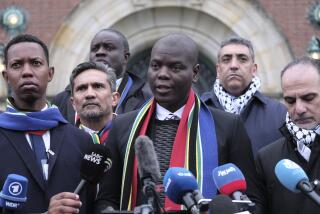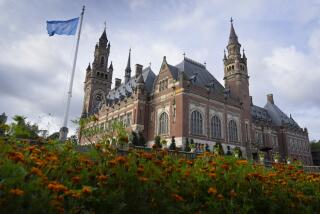Catching the Big Fish
- Share via
THE HAGUE — He was a soldier. His assignment: Greet arriving busloads of surrendering Bosnian Muslim men near Srebrenica, take them off in groups of 10 and shoot them in the back. Drazen Erdemovic, a 24-year-old Croatian kid with acne scars, stood up in court and admitted he was guilty of crimes against humanity--the first guilty plea for the International Criminal Tribunal for the Former Yugoslavia.
Others indicted for war crimes have appeared before the tribunal looking sullen, bewildered or simply angry. Not Erdemovic. He wanted to explain why he’d pulled the trigger. His fellow soldiers had taunted him, telling him if he felt so sorry for the Muslims, he could line up with them and be shot dead as well. Erdemovic sobbed, saying he couldn’t bear the thought of leaving behind his wife and 9-month-old son. Tissues and water were administered. His defense attorney told him the worst was over. “No, it is not,” Erdemovic replied, “I can be silent no longer.”
The tribunal is fortunate that Erdemovic is a kid with a conscience--or at the very least, an inability to keep his mouth shut. For weeks, Erdemovic has been helping prosecutors compile their case against the “big fish” of Srebrenica: Radovan Karadzic and Ratko Mladic, the men who repeatedly planned and ordered mass slaughters.
But the tribunal itself has survived this far by being a child of fortune, relying, like Blanche DuBois, “on the kindness of strangers.” The ICTY budget is $40 million this year, but the United Nations has only sent $15 million thus far.
So tribunal officials and advocates go hat in hand, seeking contributions from other sources. Malaysia is a big financial supporter, as are Italy and Pakistan. The United States has contributed more than $2 million in computer equipment. The U.S. and other countries have also contributed personnel--attorneys, investigators and various experts. Private foundations have kicked in support. Law students worldwide have volunteered as clerks for the prosecutor.
But for all that, the tribunal has but one courtroom and lacks the money to hire a second shift of translators, so court hours are limited.
But the most significant thing the tribunal lacks is a police force. Fifty eight people have been indicted for war crimes in the former Yugoslavia and 50 remain at large. International human rights law and even working international courts don’t mean much without any mechanism for international law enforcement. The tribunal thus must rely on the kindness of national armies to arrest those indicted, and the correct political winds in their respective national capitals. Still at large are Bosnian Serb leader Karadzic and military commander Mladic. The Dayton peace accord authorizes NATO troops to arrest any indicted war criminal it encounters, but the joke here is that NATO troops cross the street to avoid encountering the two men.
It is important, of course, to bring “small fish” war criminals to trial--the actual perpetrators of these gruesome acts. Perhaps when the next Bosnia happens somewhere else in the world, similar small fish will think twice before engaging in such activities. But that argument applies in even greater measure to those who instigate and inflame such conflicts in the first place.
A tribunal spokesman put it this way: Allowing indicted war criminals to walk free “amounts to the issuance of a license to kill for future tyrants.”
Last week in Florence, tribunal President Antonio Cassese delivered that message to signatories of the Dayton peace accords and warned that free and fair elections are impossible in a political atmosphere polluted by indicted war criminals still at large.
In a week or so, the tribunal will use the one tool it has at its disposal: the media. Prosecutors will detail the twin indictments for genocide against Karadzic and Mladic in open court. The tribunal hopes the grim details will produce public pressure on the international community to make the arrests.
There is a familiar saying in Los Angeles, with its own sorry history of ethnically diverse neighbors who just can’t get along: “No justice, no peace.”
It’s something Drazen Erdemovic has learned over the past year since Srebrenica. There could be no peace for him until he broke his silence and had his day in court. Can there be lasting peace in the former Yugoslavia until Karadzic and Mladic have been brought to justice as well?
More to Read
Sign up for Essential California
The most important California stories and recommendations in your inbox every morning.
You may occasionally receive promotional content from the Los Angeles Times.













